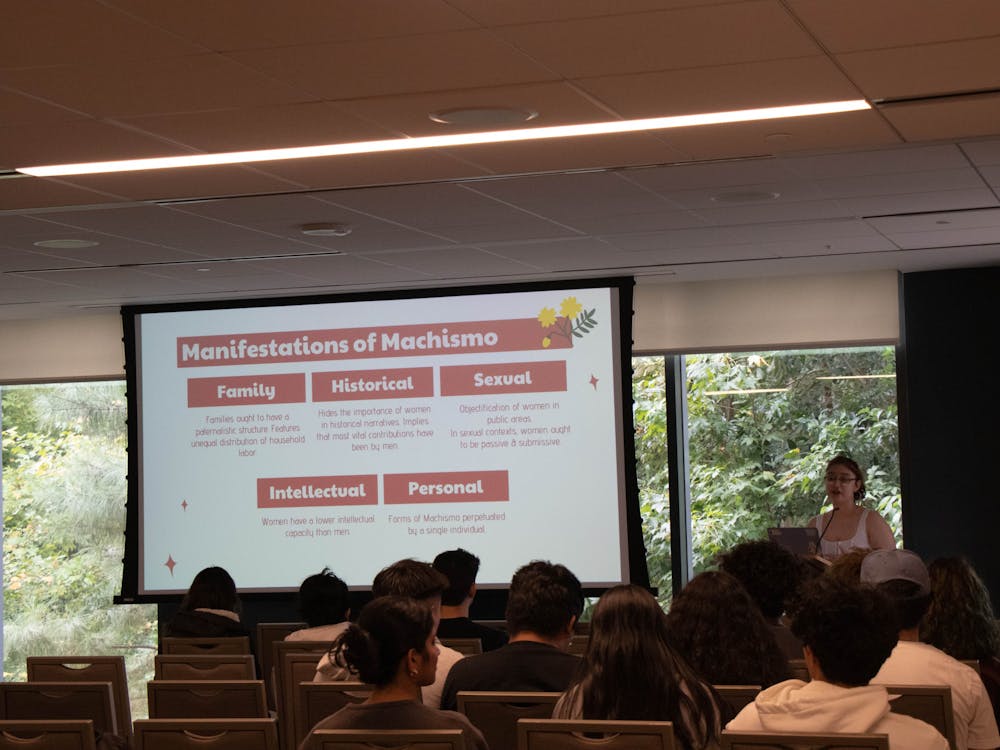Mi Gente collaborated with the Duke Women’s Center in a presentation about machismo’s societal significance, concluding with an introspective activity and discussion. The event, held on Oct. 3, was a part of Mi Gente’s Latin Heritage Month event series.
Junior Nathalia Compres Perez, Mi Gente’s cultural chair and the event’s organizer, opened the presentation by defining and deconstructing machismo, a term closely associated with hypermasculinity and patriarchy.
“Machismo is considered by many to be like a form of exaggerated masculinity,” she said.
Compres Perez elaborated by diving into types of machismo and touching on how machismo enforces a paternalistic familial structure as well as the superiority of men. The different ways in which machismo can be expressed were also explored, including but not limited to educational, legislative and historical sectors.
Compres Perez made it a point to highlight the prevalence of matrilineal Native American societies and the imposition of the patriarchy by Spanish colonialism.
“I let the historical aspects of [machismo] shine through, especially because a lot of indigenous people believe [in] fighting against the systems of power that currently exist as a result of Western culture,” she said.
To round out the presentation, Compres Perez provided statistics that left the crowd in silence. Thirty eight percent of Latinx mothers are stay-at-home mothers, she said.
“[In] the culture of machismo that we currently live in, it is essentially expected that a woman's role is to get married and have kids, and [the mother is] the one that's going to take care of the kids,” she explained.
After the presentation, the audience received a handout to participate in a “who’s in the room” activity, where participants filled out yes or no questions and swapped papers anonymously to get a sense for the audience’s experience with machismo. Statements on the handout included: “I was raised with the expectation that women should listen to men,” and “Emotions are for women, men are expected to be strong.”
After the activity, the audience gathered in a circle to have an open discussion concerning anything related to machismo. Participants engaged in difficult conversations — opening up on upbringings and how they have attempted to break the machismo cycle.
Spark Fellow Ana Ramirez, Trinity ‘20, shared how growing up, her mom did most of the household cleaning, while her father was not expected to clean. In her adult life, Ramirez decided to speak up and had a conversation with her father to have him realize why he needed to start helping out her mother in cleaning duties.
“[I’m] hopeful that by having small conversations like this one tonight, that will begin to undo the history and the impacts that machismo has had on all of our lives,” Ramirez said.
First-year Mariana Meza enjoyed having the space to be vulnerable and open up on machismo.
When asked about machismo’s presence at Duke, Meza said, “every primarily white — every institution, not even white, and on every level— [is] so deeply rooted in all of these norms that machismo manifests itself in ways we don't even notice.”
Get The Chronicle straight to your inbox
Signup for our weekly newsletter. Cancel at any time.

Michael Ramos is a Trinity first-year and a staff reporter of The Chronicle's 118th volume.

